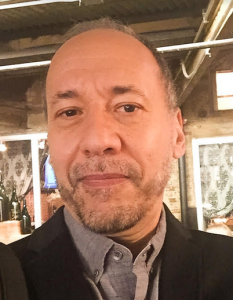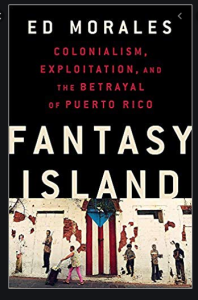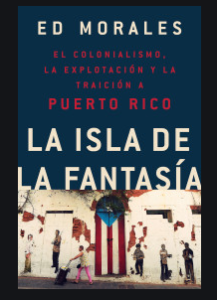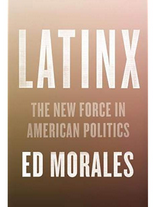 In his FPP Interview, Ed Morales shares what’s surprised him about the “Latinx” discourse, what meaningful acts will tip the scales in 2019, where he’d take us in Puerto Rico and much more. Hear Morales read live at “What Just Happened: Writers Respond to Our American Crises” at 6pm this Sunday, November 10th at Silvana in Harlem. He’ll be joined by Ibrahim Abdul-Matin, Max S. Gordon, David Tomas Martinez, Nara Milanich and Sarah Van Arsdale. Silvana is located at 300 W. 116th St near Frederick Douglass Blvd. Admission is free.
In his FPP Interview, Ed Morales shares what’s surprised him about the “Latinx” discourse, what meaningful acts will tip the scales in 2019, where he’d take us in Puerto Rico and much more. Hear Morales read live at “What Just Happened: Writers Respond to Our American Crises” at 6pm this Sunday, November 10th at Silvana in Harlem. He’ll be joined by Ibrahim Abdul-Matin, Max S. Gordon, David Tomas Martinez, Nara Milanich and Sarah Van Arsdale. Silvana is located at 300 W. 116th St near Frederick Douglass Blvd. Admission is free.
 You have written profoundly on Puerto Rico past and present in your new book Fantasy Island: Colonialism, Exploitation, and The Betrayal of Puerto Rico. If you could take us all to Puerto Rico with you today, whom would we visit first? Why, and why now?
You have written profoundly on Puerto Rico past and present in your new book Fantasy Island: Colonialism, Exploitation, and The Betrayal of Puerto Rico. If you could take us all to Puerto Rico with you today, whom would we visit first? Why, and why now?
It’s hard to pick just one place. The first thing I would think about is going to the El Yunque Rainforest, where my mom’s side of the family is from, because it’s a humbling incredible place dominated by nature and emblematic of the island’s indigenous past. But the hurricane has unfortunately closed most of the trails, so that bums me out. Then we’d drive down the mountain to go to Luquillo Beach and then the  kioskos to get cuchifritos and agua de coco.
kioskos to get cuchifritos and agua de coco.
What do you wish every American knew about Puerto Rico?
That our colonial status is unjust and we don’t have full citizenship on the island, and that it is so green and beautiful.
You’ve written about the joy and power of Puerto Rican #RickyRenuncia protestors. How are those protests still reverberating today? What lessons should the rest of us take from their example?
Just last night there was a major demonstration in Old San Juan led by students and workers protesting austerity cuts on the University of Puerto Rico and the minimum wage of $7.25 per hour. It was just as raucous as the Ricky Renuncia protests of last summer and has already generated the hashtag #invierno2019.
 Your book Latinx: The New Force in American Politics and Culture is shortlisted for the 2019 Nayef Al-Rodhan Prize for Global Cultural Understanding. Has anything surprised you about the life of “Latinx” to-date? How is the state of acceptance vs resistance in 2019?
Your book Latinx: The New Force in American Politics and Culture is shortlisted for the 2019 Nayef Al-Rodhan Prize for Global Cultural Understanding. Has anything surprised you about the life of “Latinx” to-date? How is the state of acceptance vs resistance in 2019?
I’m surprised at the negative energy it has created here and there. I respect people who identify as African- or indigenous-descended, both identities which resonate with me but I don’t think we should giving up on the potential of Latinx unity by ceding Latinidad to marketers and those who marginalize people of color. I think Latinx people should strongly identify with national identities, African and indigenous identities while at the same time try to forge ties with like-minded Latinx and make it an identity that privileges marginalized people.
There is also an attack from the right wing which claims the word is a gringo imposition on Spanish, which is ridiculous because there are so many English words used by Spanish speakers like “Internet,” for instance. They also claim it is an elitist term imposed on people when no one is imposing, just choosing to use it. It’s possible new labels like “Latine” might come along and replace, and that’s fine with me. But I do think that many LGBTQ people take seriously how Latinx includes them and we should recognize that, and it’s one of the reasons I embrace it.
Is there a piece of writing– yours or someone else’s–that really speaks to your experience in November 2019?
I don’t know, 1984, maybe?
What should the future be?
Resistance, liberation.
What gives you hope?
Lula being freed from a Brazilian jail.
What keeps you awake at night?
The desire to get it right.
What is meaningful action these days? What will tip the scales?
This should be a combination of small acts at home and in the community and public discourse and writing and speaking and taking part in protests and solidarity actions.
What kind of speech, political or otherwise, resonates with you right now?
I think an important thing is trying to get past the idea that identity politics and class politics are mutually exclusive and to continually engage in a critique of unequal wealth distribution and raise awareness about the climate crisis.
Ed Morales is an author and journalist who has written for The Nation, The New York Times, The Washington Post, Rolling Stone, Jacobin, and The Guardian. He was a staff writer at The Village Voice and columnist at Newsday. He is the author of Latinx: The New Force in Politics and Culture (Verso Books, 2018), Living in Spanglish (St. Martins, 2002), and The Latin Beat: From Rumba to Rock (Da Capo Press, 2003). His new book, Fantasy Island: Colonialism, Exploitation, and the Betrayal of Puerto Rico was published in September 2019 by Bold Type Press. Morales is also a poet whose work has appeared in Aloud: Voices from the Nuyorican Poets Café (Henry Holt, 1993) and various small magazines, and his fiction has appeared in Iguana Dreams (HarperCollins, 1992), and Boricuas (Ballantine, 1994). He has participated in residencies as a member of Nuyorican Poets Café Live, touring as a spoken-word performer in several cities throughout the east coast, in California, Florida, Texas, and Denmark. Morales has appeared on CNN, Democracy Now, HBO Latino, CNN Español, WNBC-TV’s Visiones, WABC’s Tiempo, BBC television and radio, and The Laura Flanders Show, and hosted his own radio show, “Living in Spanglish,” on WBAI-FM in New York from 2015–2018.
